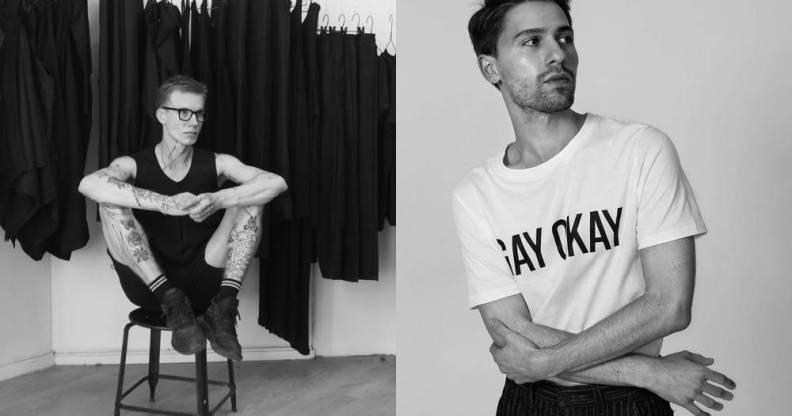These queer designers are on a mission to break fashion’s binary and make lasting change

Lauri Järvine of LAURIJARVINENSTUDIO and Marco Scaiano Berlin’s Gay Okay t-shirts are both available on Erebus. (LAURIJARVINENSTUDIO/Marco Scaiano Berlin)
Meet four up-and-coming queer designers putting their money where their mouths are when it comes to sustainability, diversity and inclusion in fashion.
Erebus is a platform which champions emerging designers with a focus on genderless slow fashion, as well as an emphasis on community and storytelling.
“You can get fashion anywhere,” explains founder Chris Tull-Williams. “You can get clothes anywhere, but I want to hear their stories.”
PinkNews has collaborated with Erebus to shine a light on four queer creatives seeking to make lasting change in the industry and beyond.
“A lot of our designers are doing interesting things with sustainability, body diversity, gender diversity,” Chris says. “What we do is find these designers that have an interesting point of view, and by bringing them together in one place, give them a louder voice.”
Marco Scaiano Berlin.
As the fashion world – and the world, period – fights through turbulent times, the sense of community fostered by Erebus is being put to special use with a series of charitable projects.
One such effort is a collaboration with the Berlin-based designer Marco Scaiano, who has designed a line of t-shirts bearing the blunt message: “Gay Okay.”
The slogan is a direct response to an article Marco came across, written by a homophobic priest, that claimed to be gay is not in fact okay.
“I was left speechless when I read it,” Marco says. “I discussed it with my team and it was immediately clear that we had to create an answer.”
Photographed by Berlin-based photographer Alice Wonder, the t-shirt is modelled by members of Berlin’s LGBT+ community.
Proceeds benefit the Outside Project, an LGBT+ homeless shelter and community centre in London; and Rainbow Railroad, an international organisation which helps queer people persecuted for their identity travel to safety.
Erebus carries a sharp edit of Marco Scaiano Berlin, a genderless line defined by clean lines and unconventional shapes handmade in Berlin.
“Genderless fashion means equality to me,” says Marco. “My fashion is for everyone, no matter what gender, no matter what sexuality.”
Shop Marco Scaiano Berlin at Erebus.
Lauri Järvinen.
Finnish designer Lauri Järvinen says his identity as a proud gay man informs the way he interrogates gender and the human form through clothing.
“I think fashion is such a playful art form, it’s silly to restrict it by gender,” he says.
“My vision of style is to hide ‘the norm’ of the body. I want to twist the human eye to look the person as a person, not as a body or object.”
The unisex designs at LAURIJARVINENSTUDIO, produced using local, sustainable materials with an innovative zero-waste technique, use exaggerated draping to create architectural forms, all in understated black.
View this post on Instagram
Cutting his clothes so that they fit people of all body types is a time-consuming task, but for Lauri, it’s worth it.
“I love to see people with different bodies buy the same piece of clothing from our line, and see how the clothing becomes totally different with each,” he says.
“The most important thing in my work is to make people shine, to tell them it’s OK to be you and only you.”
Shop LAURIJARVINENSTUDIO at Erebus.
Mark Baigent.
Mark Baigent relocated to Bali from his native Austria in 2016. A year later, he opened his own factory in an underprivileged part of the island, employing local artisans to help bring his minimalist gender-free designs to life.
“I’ve brought my own journey of self-discovery, finding out who I am, into my fashion,” he says.
“I don’t believe in genders, I don’t believe in male or female. I don’t believe in homosexuality or heterosexuality either – I believe in attraction, I think that’s all we need to know.”
His avant-garde designs have a timeless, lived-in feel, with neat draping, clean lines and locally-inspired prints and colours. Mark says each piece is constructed to give the wearer “security” and comfort regardless of their body type, without relying on oversized, shapeless forms.
View this post on Instagram
“We express who we are with the clothes we’re wearing, and we should be able to do that with whatever we want,” he adds.
Mark is keenly aware of some of the darker issue plaguing fashion, and also strives to create awareness of fair labour in fashion, while setting a standard at his factory in Bali.
In response to the pandemic, Mark collaborated with Erebus to deliver face coverings to The Outside Project, The partnership also benefited Sanggar SWARA, an organisation which benefits and is made up of young trans women in Jakarta, Indonesia.
Dhenze.
Dhenze is based in London, but draws much of its inspiration from another city with a thriving LGBT+ scene: Berlin.
Since its inception the brand has focused on gender-free collections, tapping into Berlin’s electronic music and fetish scenes to evoke a dark but playful aesthetic steeped in counter-culture.
Think blazers cut away at the chest, transparent PVC panels on trousers and jackets, and rope detailing inspired by shibari, the Japanese art of bondage.
View this post on Instagram
Produced locally in London to lessen its carbon footorint, Dhenze’s designs are brought to life with striking photoshoots which feature people of all genders, including trans folk.
As Chris says, “the point isn’t to shout out that they’re trans-inclusive. It’s just, here’s a beautiful woman, wearing beautiful clothes”.
Shop Dhenze at Erebus, or discover its full collection of genderless, sustainable fashion here.

